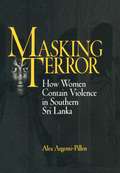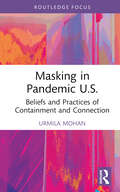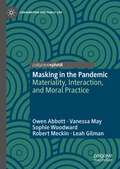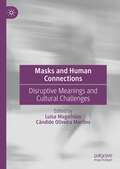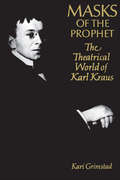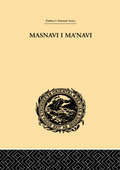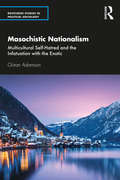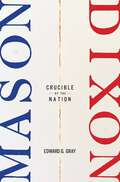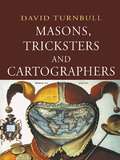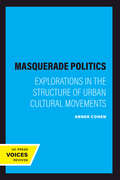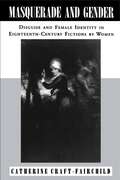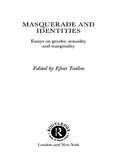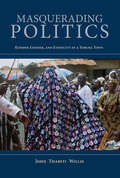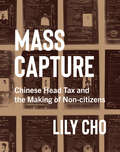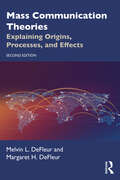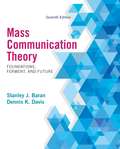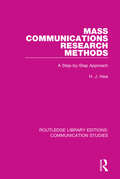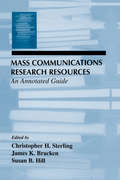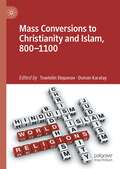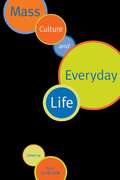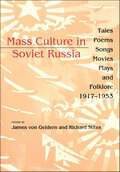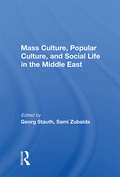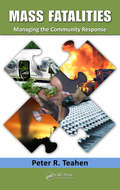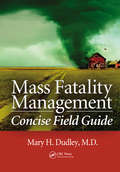- Table View
- List View
Masking Terror
by Alex Argenti-PillenIn Sri Lanka, staggering numbers of young men were killed fighting in the armed forces against Tamil separatists. The war became one of attrition--year after year waves of young foot soldiers were sent to almost certain death in a war so bloody that the very names of the most famous battle scenes still fill people with horror. Alex Argenti-Pillen describes the social fabric of a rural community that has become a breeding ground and reservoir of soldiers for the Sri Lankan nation-state, arguing that this reservoir has been created on the basis of a culture of poverty and terror.Focusing on the involvement of the pseudonymous village of Udahenagama in the atrocities of the civil war of the late 1980s and the interethnic war against the Tamil guerrillas, Masking Terror describes the response of women in the rural slums of southern Sri Lanka to the further spread of violence. To reconstruct the violent backgrounds of these soldiers, she presents the stories of their mothers, sisters, wives, and grandmothers, providing a perspective on the conflict between Sinhalese and Tamil populations not found elsewhere. In addition to interpreting the impact of high levels of violence on a small community, Argenti-Pillen questions the effects of trauma counseling services brought by the international humanitarian community into war-torn non-Western cultural contexts. Her study shows how Euro-American methods for dealing with traumatized survivors poses a threat to the culture-specific methods local women use to contain violence.Masking Terror provides a sobering introduction to the difficulties and methodological problems field researchers, social scientists, human rights activists, and mental health workers face in working with victims and perpetrators of ethnic and political violence and large-scale civil war. The narratives of the women from Udahenagama provide necessary insight into how survivors of wartime atrocities reconstruct their communicative worlds and disrupt the cycle of violence in ways that may be foreign to Euro-American professionals.
Masking in Pandemic U.S.: Beliefs and Practices of Containment and Connection (Routledge Focus on Anthropology)
by Urmila MohanThis anthropological study explores the beliefs and practices that emerged around masking in the U.S. during the COVID-19 pandemic. Americans responded to this illness as unique subjects navigating the flux of social and corporeal boundaries, supporting certain beliefs and acting to shape them as compelling realities. Debates over health and safety mandates indicated that responses were fractured with varied subjectivities in play—people lived in different worlds and bodies were central in conflicts over breathing, masking and social distancing. Contrasting approaches to practices marked the limits and possibilities of imaginaries, signaling differences and similarities between groups, and how actions could be passageways between people and possibilities. During a time of uncertainty and loss, the "efficacious intimacy" of bodies and materials embedded beliefs, values, and emotions of care in mask sewing and usage. By exploring these practices, the author reflects on how American subjects became relational selves and sustained response-able communities, helping people protect each other from mutating viruses as well as moving forward in a shifting terrain of intimacy and distance, connection, and containment.
Masking in the Pandemic: Materiality, Interaction, and Moral Practice (Consumption and Public Life)
by Sophie Woodward Vanessa May Owen Abbott Leah Gilman Robert MeckinThis book assumes an “everyday life” perspective towards masking in public spaces in the UK during the Covid-19 pandemic. Facemasks are perhaps one of the most tangible ways in which the changes wrought by the Covid-19 pandemic were made visible. In the space of a few months in 2020, masking in the UK went from being almost non-existent in public to becoming widespread, both before and after the UK government mandated masking in most enclosed public spaces in July 2020. In this context, the speed and scale of the introduction of masking in public settings offers sociologists a rare chance to document the (contested) emergence of a new social practice. We argue that the nature of masking during the pandemic means that masking practices need to be understood through the entwinement of material, interactional, and moral dimensions. We develop a relational perspective to explore the relationship between the materiality and moral significance of masking, and how this translated into the development of masking practices in public spaces. The authors argue further that the specific context of masking during the pandemic provides sociologists with a unique lens to think through the nature of material, interactional, and moral practices in general.
Masks and Human Connections: Disruptive Meanings and Cultural Challenges
by Luísa Magalhães Cândido Oliveira MartinsThis interdisciplinary collection explores four distinct perspectives about the mask, as object of use for protection, identity, and disguise. In part I, contributors address human identities within collective social performance, with chapters on performativity and the far right and masked identities in political resistance and communication. Part II focuses on the mask as a signifying object with strong representational challenges, exploring representations in festivals, literature, and film. Part III investigates the ambiguous use of the mask as a protective and concealing element, delving into visual culture and digital social media contexts. Finally, Part VI draws on the work of Levinas and Deleuze to investigate a philosophical view of the mask that addresses memory and ethics within intersubjective relationships. Questioning the contemporary world, using communication, sociology, visual culture, and philosophical theory, the volume provides a pedagogical and formative perspective on the mask.
Masks of the Prophet: The Theatrical World of Karl Kraus
by Karl Grimstad'When the name "Hitler" is mentioned, nothing occurs to me' – so said Karl Kraus. For this leading Viennese Jewish critic and intellectual the touchstone of art was ethics. How could he be speechless in the face of a threat to all that ethics means? To answer this question, the author makes a detailed chronological study of Kraus's intellectual activity as reflected in his work on the theatre. The results are presented in five chapters, each dealing with a different 'mask' adopted by Kraus during the period 1892-1936. Grimstad considers not only theatre and drama criticism in Die Fackel and Kraus's dramatic writings, but also biographical data, to help uncover the rationale of his work. That rationale is the logic of the theatrical mode in which he lived and wrote. The stage was not only his subject matter, it determined what he would see and say. Grimstad argues that when Kraus wrote, his words were the speech of an 'actor' who was often infatuated with himself and obsessed with the need to overwhelm his rival 'actors.' When Hitler's storm-troopers began their march, he could say nothing for the world in which his thought took shape had become a world of theatrics, not 'Realpolitik.' Kraus criticized plays without reading them and performances without seeing them, obsessed with the belief that his was the voice of all that was true, good, and beautiful. Grimstad observes that he was a prophet who confused the divine inspiration with the Thespian urge, playing to an audience, using a mask for each of his roles, yet thinking he spoke to all mankind, bringing them pure ethos. This volume will be of particular interest to those working in the fields of theatre criticism, comparative literature, German literature, and Jewish intellectual history.
Masnavi I Ma'navi: The Spiritual Couplets of Maulana Jalalu-'D-Din Muhammad Rumi
by E.H. WhinfieldFirst Published in 2000. This text is a compliation of spiriutal couplets and teachings of Maulana Jalalu-'D-Din Muhammad Rumi. The Masnavi is a summary of the religious sentiments and doctrine of Islam as interpreted and modified by Muhammadan Mystics or Sufis. Includes 6 books, from works in 1898.
Masochistic Nationalism: Multicultural Self-Hatred and the Infatuation with the Exotic (Routledge Studies in Political Sociology)
by Göran AdamsonThis book examines the nature of the conflict between right-wing populism and multiculturalism: the West’s defining conflict in the modern age. Drawing on a plethora of evidence from politics and culture in the West, it argues that these two positions, while antagonistic on the surface, are in fact similar: nationalism and multiculturalism are two names for one idea, the difference between them being simply a matter of geography; both outlooks have their roots in romanticism, sentimentalism, arrogance and a racist outlook. Rather than defend either approach, this volume urges us to consider the importance of roots and argues for greater consideration of what classical liberalism, socialism and feminism can do to break this impasse in our political thinking, with a concern for equality and concern for solidarity, regardless of cultural practice. As such it will appeal to social and political theorists with interests in political sociology and culture.
Mason-Dixon: Crucible of the Nation
by Edward G. GrayThe first comprehensive history of the Mason-Dixon Line—a dramatic story of imperial rivalry and settler-colonial violence, the bonds of slavery and the fight for freedom.The United States is the product of border dynamics—not just at international frontiers but at the boundary that runs through its first heartland. The story of the Mason-Dixon Line is the story of America’s colonial beginnings, nation building, and conflict over slavery.Acclaimed historian Edward Gray offers the first comprehensive narrative of the America’s defining border. Formalized in 1767, the Mason-Dixon Line resolved a generations-old dispute that began with the establishment of Pennsylvania in 1681. Rivalry with the Calverts of Maryland—complicated by struggles with Dutch settlers in Delaware, breakneck agricultural development, and the resistance of Lenape and Susquehannock natives—had led to contentious jurisdictional ambiguity, full-scale battles among the colonists, and ethnic slaughter. In 1780, Pennsylvania’s Act for the Gradual Abolition of Slavery inaugurated the next phase in the Line’s history. Proslavery and antislavery sentiments had long coexisted in the Maryland–Pennsylvania borderlands, but now African Americans—enslaved and free—faced a boundary between distinct legal regimes. With the passage of the Fugitive Slave Act in 1850, the Mason-Dixon Line became a federal instrument to arrest the northward flow of freedom-seeking Blacks. Only with the end of the Civil War did the Line’s significance fade, though it continued to haunt African Americans as Jim Crow took hold.Mason-Dixon tells the gripping story of colonial grandees, Native American diplomats, Quaker abolitionists, fugitives from slavery, capitalist railroad and canal builders, US presidents, Supreme Court justices, and Underground Railroad conductors—all contending with the relentless violence and political discord of a borderland that was a transformative force in American history.
Masons, Tricksters and Cartographers: Comparative Studies in the Sociology of Scientific and Indigenous Knowledge (Studies In The History Of Science, Technology And Medicine Ser.)
by David TurnbullIn an eclectic and highly original study, Turnbull brings together traditions as diverse as cathedral building, Micronesian navigation, cartography and turbulence research. He argues that all our differing ways of producing knowledge - including science - are messy, spatial and local. Every culture has its own ways of assembling local knowledge, thereby creating space thrugh the linking of people, practices and places. The spaces we inhabit and assemblages we work with are not as homogenous and coherent as our modernist perspectives have led us to believe - rather they are complex and heterogeneous motleys.
Masquerade Politics: Explorations in the Structure of Urban Cultural Movements
by Abner CohenCarnival, that image of sensuous frivolity, is shown by Abner Cohen to be a masquerade for the dynamic relations between culture and politics. His masterful study details the transformation of a local, polyethnic London fair to a massive, exclusively West Indian carnival, known as "Europe's biggest street festival," which in 1976 occasioned a bloody confrontation between black youth and the police and which has since become a fiercely contested cultural event.Cohen contrasts the development of the London carnival with the development of other carnivalesque movements, including the Renaissance Pleasure Faire of California. His valuable analysis of these relatively little-explored urban cultural movements advances further the theoretical formulations developed in his previous studies.
Masquerade and Gender: Disguise and Female Identity in Eighteenth-Century Fictions by Women (G - Reference, Information and Interdisciplinary Subjects)
by Catherine A. Craft-FairchildTerry Castle's recent study of masquerade follows Bakhtin's analysis of the carnivalesque to conclude that, for women, masquerade offered exciting possibilities for social and sexual freedom. Castle's interpretation conforms to the fears expressed by male writers during the period—Addison, Steele, and Fielding all insisted that masquerade allowed women to usurp the privileges of men. Female authors, however, often mistrusted these claims, perceiving that masquerade's apparent freedoms were frequently nothing more than sophisticated forms of oppression. Catherine Craft-Fairchild's work provides a useful corrective to Castle's treatment of masquerade. She argues that, in fictions by Aphra Behn, Mary Davys, Eliza Haywood, Elizabeth Inchbald, and Frances Burney, masquerade is double-sided. It is represented in some cases as a disempowering capitulation to patriarchal strictures that posit female subordination. Often within the same text, however, masquerade is also depicted as an empowering defiance of the dominant norms for female behavior. Heroines who attempt to separate themselves from the image of womanhood they consciously construct escape victimization. In both cases, masquerade is the condition of femininity: gender in the woman's novel is constructed rather than essential.Craft-Fairchild examines the guises in which womanhood appears, analyzing the ways in which women writers both construct and deconstruct eighteenth-century cultural conceptions of femininity. She offers a careful and engaging textual analysis of both canonical and noncanonical eighteenth-century texts, thereby setting lesser-read fictions into a critical dialogue with more widely known novels. Detailed readings are informed throughout by the ideas of current feminist theorists, including Luce Irigaray, Julia Kristeva, Mary Ann Doane, and Kaja Silverman. Instead of assuming that fictions about women were based on biological fact, Craft-Fairchild stresses the opposite: the domestic novel itself constructs the domestic woman.
Masquerade and Identities: Essays on Gender, Sexuality and Marginality
by Efrat TseëlonMasquerade, both literal and metaphorical, is now a central concept on many disciplines. This timely volume explores and revisits the role of disguise in constructing, expressing and representing marginalised identities, and in undermining easy distinctions between 'true' identity and artifice.The book is interdisciplinary in approach, spanning a diverse range of cultures and narrative voices. It provides provocative and nuanced ways of thinking about masquerade as a tool for construction, and a tool for critique. The essays interrogate such themes as:*mask and carnival*fetish fashion*stigma of illegitimacy*femininity as masquerade*lesbian masks*cross-dressing in Jewish folk theatre*the mask in seventeenth and eighteenth century London and nineteenth century France*the voice as mask.
Masquerading Politics: Kinship, Gender, and Ethnicity in a Yoruba Town
by John Thabiti WillisIn West Africa, especially among Yoruba people, masquerades have the power to kill enemies, appoint kings, and grant fertility. John Thabiti Willis takes a close look at masquerade traditions in the Yoruba town of Otta, exploring transformations in performers, performances, and the institutional structures in which masquerade was used to reveal ongoing changes in notions of gender, kinship, and ethnic identity. As Willis focuses on performers and spectators, he reveals a history of masquerade that is rich and complex. His research offers a more nuanced understanding of performance practices in Africa and their role in forging alliances, consolidating state power, incorporating immigrants, executing criminals, and projecting individual and group power on both sides of the Afro-Atlantic world.
Mass Appeal
by Edward D. BerkowitzMass Appeal describes the changing world of American popular culture from the first sound movies through the age of television. In short vignettes, the book reveals the career patterns of people who became big movie, TV, or radio stars. Eddie Cantor and Al Jolson symbolize the early stars of sound movies. Groucho Marx and Fred Astaire represent the movie stars of the 1930s, and Jack Benny stands in for the 1930s performers who achieved their success on radio. Katharine Hepburn, a stage and film star, illustrates the cultural trends of the late 1930s and early 1940s. Humphrey Bogart and Bob Hope serve as examples of performers who achieved great success during the Second World War. Walt Disney, Woody Allen, and Lucille Ball, among others, become the representative figures of the postwar world. Through these vignettes, the reader comes to understand the development of American mass media in the twentieth century.
Mass Capture: Chinese Head Tax and the Making of Non-citizens
by Lily ChoUnder the terms of the Chinese Immigration Act of 1885, Canada implemented a vast protocol for acquiring detailed personal information about Chinese migrants. Among the bewildering array of state documents used in this effort were CI 9s: issued from 1885 to 1953, they included date of birth, place of residence, occupation, identifying marks, known associates, and, significantly, identification photographs. The originals were transferred to microfilm and destroyed in 1963; more than 41,000 grainy reproductions of CI 9s remain.Lily Cho explores how the CI 9s functioned as a form of surveillance and a process of mass capture that produced non-citizens, revealing the surprising dynamism of non-citizenship constantly regulated and monitored, made and remade, by an anxious state. The first mass use of identification photography in Canada, they make up the largest archive of images of Chinese migrants in the country, including people who stood no chance of being photographed otherwise. But CI 9s generated far more information than could be processed, and there is nothing straightforward about the knowledge that they purported to contain. Cho finds traces of alternate forms of kinship in the archive as well as evidence of the ways that families were separated. In attending to the particularities of these images and documents, Mass Capture uncovers the alternative story that lies in the refusals and resistances enacted by the mass captured.Illustrated with painstakingly reconstituted digital reproductions of the microfilm record, Mass Capture reclaims the CI 9s as more than documents of racist repression, suggesting the possibilities for beauty and dignity in the archive, for captivation as well as capture.
Mass Communication Theories: Explaining Origins, Processes, and Effects
by Margaret H. DeFleur Melvin L. DeFleurThe second edition of this innovative textbook provides a comprehensive overview of mass communication theories, as well as their origins and empirical supports in psychology, sociology, political science, and philosophy. Each chapter presents a specific theory, describing its basic structure in simple formal terms and providing an accessible summary of the research studies and scholarly writings from which it developed. It breaks each complex theory down into five or six interlinked basic propositions, making them easily digestible for students. This new edition includes up-to-date research; improved coverage of all theories presented; expanded treatments of theories such as cultivation theory, the spiral of silence, and framing; contemporary and social media examples; chapter discussion questions; and informative charts and figures. This textbook serves as an accessible core text for undergraduate and graduate Mass Communication, Communication Theory, and Communication and Society courses.
Mass Communication Theory: Foundations, Ferment, And Future
by Stanley J. Baran Dennis K. DavisMASS COMMUNICATION THEORY: FOUNDATIONS, FERMENT, AND FUTURE, Seventh Edition, introduces students to current and classical mass communication theories, and explains the media literacy movement in easily understood terms. Plus, this text helps students develop a better understanding of media theory so they can play a role in the media industry's future. Written in an accessible writing style, the text is designed to help increase exam performance and overall success in the course.
Mass Communications Research Methods: A Step-by-Step Approach (Routledge Library Editions: Communication Studies #7)
by H.J. HsiaOriginally published in 1988. Step-by-step, this book leads students from problem identification, through the mazes of surveys, experimentation, historical/qualitative studies, statistical analysis, and computer data processing to the final submission and publication in scientific or popular publications.
Mass Communications Research Resources: An Annotated Guide (Routledge Communication Series)
by Christopher H. Sterling Susan M. Hill James K. BrackenThis reference book is designed as a road map for researchers who need to find specific information about American mass communication as expeditiously as possible. Taking a topical approach, it integrates publications and organizations into subject-focused chapters for easy user reference. The editors define mass communication to include print journalism and electronic media and the processes by which they communicate messages to their audiences. Included are newspaper, magazine, radio, television, cable, and newer electronic media industries. Within that definition, this volume offers an indexed inventory of more than 1,400 resources on most aspects of American mass communication history, technology, economics, content, audience research, policy, and regulation. The material featured represents the carefully considered judgment of three experts -- two of them librarians -- plus four contributors from different industry venues. The primary focus is on the domestic American print and electronic media industries. Although there is no claim to a complete census of all materials on print journalism and electronic media -- what is available is now too vast for any single guide -- the most important and useful items are here. The emphasis is on material published since 1980, though useful older resources are included as well. Each chapter is designed to stand alone, providing the most important and useful resources of a primary nature -- organizations and documents as well as secondary books and reports. In addition, online resources and internet citations are included where possible.
Mass Conversions to Christianity and Islam, 800–1100
by Tsvetelin Stepanov Osman KaratayThis book explores the widespread mass conversions to Christianity and Islam that took place in Europe and Asia in the ninth to eleventh centuries. Taking a comparative perspective, contributors explore the processes at work in these conversions. Focusing on Christianity and Islam, it contrasts religious conversion in the period with earlier conversions, including those of Manichaeism in central Asia; Buddhism in east Asia; and Judaism in Khazaria, exploring why conversions to Christianity and Islam led to centralized political structures.
Mass Culture and Everyday Life
by Peter GibianMass Culture and Everyday Life is a collection of lively work from the small but seminal journal Tabloid. The book offers a clarification of the study of mass culture as it transforms daily life, providing a detailed survey of a wide range of the mass culture phenomena that have defined our everyday lives in recent years: from Hillary's hairdo to tampons, exercise fads and fashion trends; from soaps to opera to rythmn and blues; from horror movies to the interrelation of cats, pigs and mothers in Babe. This volume includes ground-breaking essays on: the boom of talk radio and talk TV; shopping as cinematic spectacle; and how "everyday life" in the university community has become a key battleground in America's "culture wars." The direct, accessible, and refreshingly personal work speak not only to an academic audience but to a wide general readership.
Mass Culture in Soviet Russia: Tales, Poems, Songs, Movies, Plays, and Folklore, 1917–1953
by James von Geldern and Richard StitesThis anthology offers a rich array of documents, short fiction, poems, songs, plays, movie scripts, comic routines, and folklore to offer a close look at the mass culture that was consumed by millions in Soviet Russia between 1917 and 1953. Both state-sponsored cultural forms and the unofficial culture that flourished beneath the surface are represented. The focus is on the entertainment genres that both shaped and reflected the social, political, and personal values of the regime and the masses. The period covered encompasses the Russian Revolution and Civil War, the mixed economy and culture of the 1920s, the tightly controlled Stalinist 1930s, the looser atmosphere of the Great Patriotic War, and the postwar era ending with the death of Stalin. Much of the material appears here in English for the first time.A companion 45-minute audio tape (ISBN 0-253-32911-6) features contemporaneous performances of fifteen popular songs of the time, with such favorites as "Bublichki," "The Blue Kerchief," and "Katyusha." Russian texts of the songs are included in the book.
Mass Culture, Popular Culture, And Social Life In The Middle East
by Georg StauthThe papers in this collection have a common theme in the question of modernity and mass culture. Two papers, those by Chaney and Featherstone respectively, discuss aspects of this theme in a general, global context, all the others are concerned more specifically with the regional context of the Middle East. All the articles in this collection were
Mass Fatalities: Managing the Community Response
by Peter R. TeahenA mass fatalities response goes far beyond returning the remains of a loved one to surviving family members. Those charged with this grim but critical responsibility will find themselves immersed in multiple tasks involving diverse individuals, organizations, and priorities. Mass Fatalities: Managing the Community Response examines multiple complex
Mass Fatality Management Concise Field Guide
by Mary H. DudleyThis student mainstay continues to be organised around constitutional themes, with new material on local elections, the politics of the centre and the limits of state power. Essential for all introductory students of British politics and current affairs.
